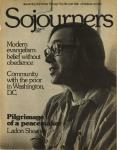I say this not as a command, but to prove by the earnestness of others that your love also is genuine. For you know the grace of our Lord Jesus Christ, that though he was rich, yet for your sake he became poor, so that by his poverty you might become rich. -- 2 Corinthians 8:8-9
Regarding the subject of renewal in structures of church leadership, how often I have been asked, “What personal attitude on the part of Christian leaders, especially clerics, would help promote the cause of church renewal in the present day?” only to find the answer -- and often the question as well -- lost in a gamut of responses ranging from fidgety embarrassment to vociferous outrage.
Remembering that it was during a three-year common life with an itinerant messiah that the earliest church leaders received a lively and effectual faith for their consciousness of being both the church and its eventual leaders, we ought not to be greatly surprised if much of what surely must have been their attitude toward themselves and their personal lives eludes us in our twentieth century western comfort. They learned from the style of Jesus’ life and from his teaching as well. Take his thoughts about poverty: the “poor in spirit” of Matthew 5 and the “poor” of Luke 6. Was Jesus commending the poor for their poverty and condemning the rich simply for their riches? That is to say, was he in some sense making poverty a virtue in itself? I think not. It was for the relief of the poor's condition that he came among them to preach the good news of release; so-called holy poverty -- a pious estate desired by elitist groups of Christians seeking perfection -- was a post-biblical development not easily supported by his teaching.
Taking a broad biblical view of creation and the fall, and considering prophetic insights concerning changes in the human social condition in the day of the Lord's coming, it is arguable that abundance, not poverty, is meant to be the provision of God's mercy for his messianic people. Poverty, then, would itself be an evil not a good, and the term holy poverty would be essentially nonsense. That being the case, perhaps we should counsel God’s people to avoid poverty. Indeed statistically, both from the national and ethnic point of view in world population, and from the social point of view locally, abundance (even opulence) is generally the earmark of the Christian community. Some sectarians regard it as the reward of the faithful. Yet Jesus himself did not avoid poverty--in fact he offered it to a rich youth in lieu of riches, nor did he counsel his disciples to avoid it; and acceptance of a brand of poverty was the first social choice of the nascent Jerusalem church.
I think we must conclude from Jesus’ teaching that poverty is not a good to be sought after for any reason, really, but especially not for its own sake; nor is it, on the other hand, an evil to be avoided. It is an evil, one to be endured by all those who call themselves the disciples of Jesus when necessary for the gospel’s sake.
Returning then to the question of renewal in the structures of church leadership: we live in a world that today is no longer divided by distance, and in which ethnic, national and class barriers are dissolving. In the evolving “one world” it is glaringly self-evident that for millions of men and women deprivation and poverty are their miserable inheritance in a sinful world. In such a world we who call ourselves by the name of Jesus Christ -- who, in fact, are the slaves of Christ and his servants to the wretched and poor wherever we find them -- must face the prospect of some sort of self-imposed poverty or be exposed as unworthy of the love of Jesus and, therefore, an offense to the gospel.
This sort of attitude, applied to so-called private life, is foreign to the thinking and repugnant to the goals of most Christian leaders today. What would be the future shape of the church if, in the spirit of Jesus’ teaching about poverty and love, Christian leaders (ordained or otherwise) were to accept their current salaries, live on an income reflecting a standard of living comparable to that of the poorest member of their congregation, and distribute the rest among the poor and needy?
When this article appeared, Graham Pulkingham was one of the leaders of the Community of Celebration in Scotland, an international center for promoting church renewal.

Got something to say about what you're reading? We value your feedback!
